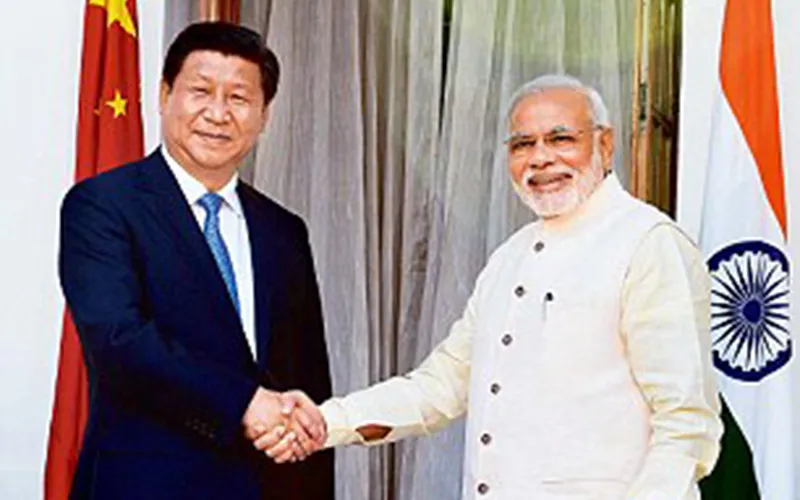In Beijing, the overwhelming question a visitor faces is: What will be the outcome of the visit of Prime Minister Narendra Modi? Will he bring a package to resolve the border question, or will he come with a basket of measures to attract Chinese investment in India?
It is a tribute to the Indian prime minister's hard-driving style, that the phlegmatic Chinese are actually intrigued by the prospect of an Indian prime ministerial visit to a capital, which witnesses many a kowtowing foreign leader passing through.
The great neglect
India is a fairly benign, if distant, distant image to the Chinese. Few are familiar with the border dispute which obsesses the Indian media.
A leading Chinese expert, Wang Jisi, the erstwhile Dean of Peking University's School of International Studies, wryly points out that China has neglected India till now, and few in China realise India's growing strength, considering that its GDP today exceeds that of Russia.
Yet, as Chinese interests expand into the Indian Ocean, China has begun to focus on India not just as a pesky wannabe that needs to be kept in its place in South Asia, but as an important linchpin in its strategy of transforming its economy from one based on investment and export, to one emphasising consumption and innovation.
India, then, becomes a destination for Chinese investment, a market for its products, the low end segment of its supply chain and a way station on its maritime silk route.
The problem that the Chinese face is India's perception of China. While the Chinese may not think much of India, the Indians certainly view China with some envy, trepidation and even fear.
In some measure this is an outcome of the traumatic defeat China inflicted on India in 1962. But it has other drivers: China's relations with Pakistan, its recent forays in the Indian Ocean, and, above all, the fact that the Chinese economy, which was roughly equal in size to the Indian in the mid-1980s, has dramatically outpaced it. Today India's GDP stands at $ 2 trillion, whereas China's is pushing beyond $9 trillion. Consequently China's military budget is three times that of India.
Five focus areas
When Modi goes to Beijing, there will be five major areas of focus: First, the continuing effort to resolve the border dispute; second, the mechanisms to maintain peace and tranquility on the border and the seas; third, bilateral relations and the issue of enhancing economic cooperation, as well as issues like river waters and Tibet; fourth, Sino-Indian cooperation in multilateral issues; and fifth, strategic business - issues relating to third countries such as US, Japan, Pakistan, Iran, West Asia, Afghanistan, and so on.
After calling for keeping the border issue aside, China has begun to realise that the border issue has become an obstacle blocking closer Sino-Indian ties. They have signaled that they are open for a quick settlement, but it is not clear as to what this means.
In the past they were agreeable in trading the Indian claim on Aksai Chin with theirs' on Arunachal Pradesh, but since 1985, the Chinese have demanded an India "concession" in the east, such as the Tawang area, in return for a Chinese acceptance of India's sovereignty over the rest of Arunachal. Aksai Chin has been conveniently forgotten, as it is securely under Chinese control.
However, the Indian side has been equally vehement in telling the Chinese that conceding the Tawang tract is just not possible. Talking of packages, indeed, the balance of expectation is on Xi Jinping to right the "eastern" tilt to their border claim.
Issues of mistrust
But the border is not the sole cause of the strategic mistrust between the two countries. China's relations with Pakistan remain problematic for India, especially when it comes to the transfer of strategic weapons and technology.
With China deciding to invest heavily in Pakistan, there is further cause of concern as to the nature of this evolving relationship.
China says it is worried about India's ties with the US and Japan. But India has moved cautiously in this area. Modi's recent remark that it was natural that China, like any other country, will seek "to increase their influence in the international space" should put things in a perspective.
If things go according to plan, the most important outcomes of the visit will be economic, though we should not rule out a surprise on the border. The bilateral trade is heavily weighted against India and Chinese investment in India is trivial, not in the least because of Indian barriers.
Xi has promised more investments, but it is really up to New Delhi to work on a strategy of getting the Chinese to put down serious money to further India's economic goals.
(The writer is a contributing editor, Mail Today and Distinguished Fellow at Observer Research Foundation, Delhi)
Courtesy: Mail Today, May 10, 2015
The views expressed above belong to the author(s). ORF research and analyses now available on Telegram! Click here to access our curated content — blogs, longforms and interviews.




 PREV
PREV


